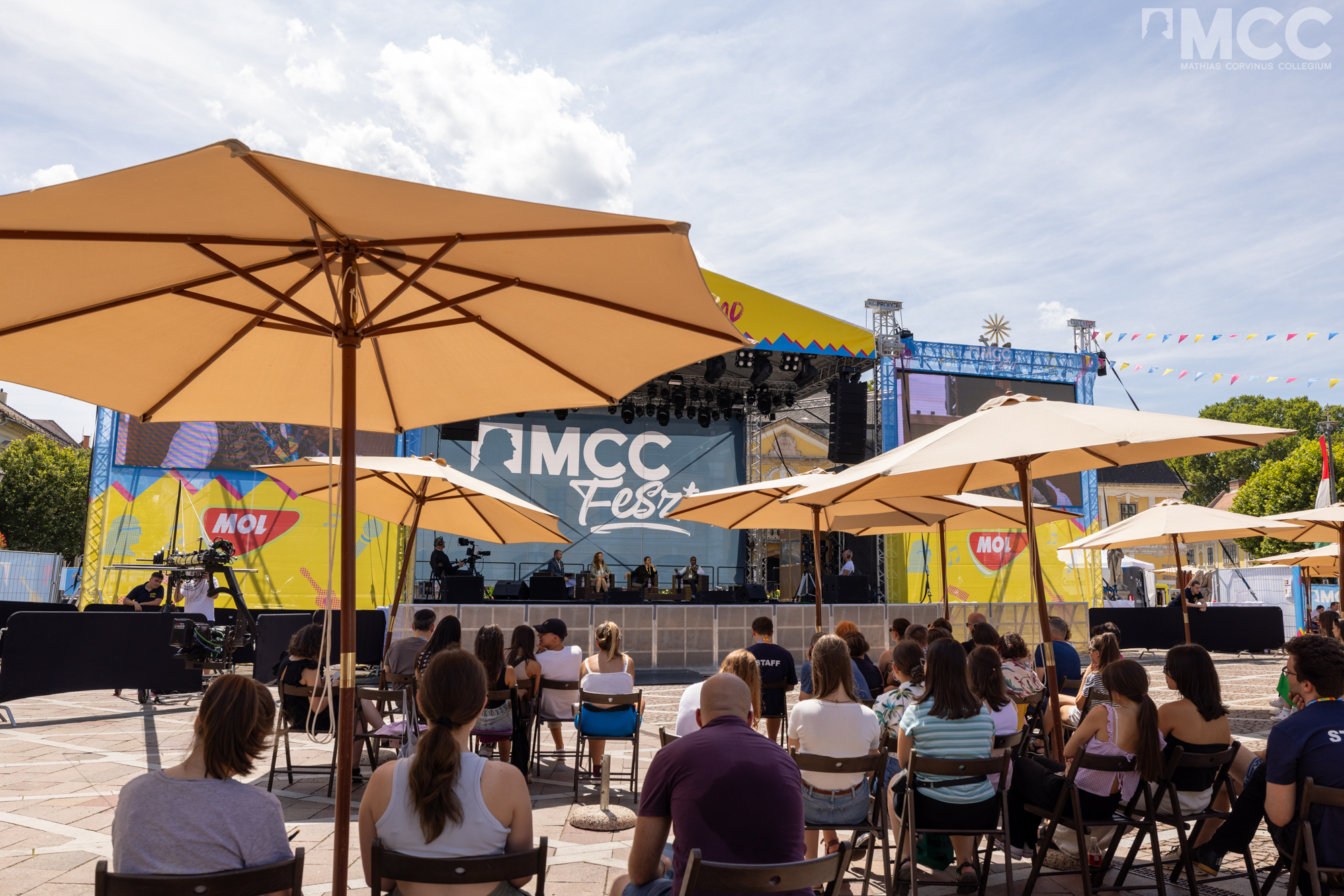An exclusive interview during the MCC Feszt in Esztergom with Zoltán Szalai, the director of Mathias Corvinus Collegium, Hungary’s fast-expanding college for talented youth
Could you please tell us what this whole MCC Feszt is about? I have never seen anything like this: evening concerts, beer drinking, partying, and then during the day, the same young people attend very serious debates about culture, the economy, politics, and so on. This is really unique.
The Mathias Corvinus Collegium, or MCC, is basically an institution for talented young individuals. From their early teens till the end of their Ph.D. studies, they can study at the MCC. The MCC Feszt is a big yearly festival where we try to show what the MCC is about and what we do.
So the MCC Feszt is mainly about interesting discussions, lectures, and debates with national and international guests.
And of course, there are also cultural programs with music in the evening and other things happening.
The MCC has 7,000 students throughout the country. We invite them to the MCC Feszt, but we also invite a lot of other people who are interested in good lectures and interesting debates. They can come for three days to Esztergom and have fun here while also attending those lectures and debates, which we keep at a very good intellectual level.
The overall tone is rather conservative, although you do have unequivocally left-wing speakers too. Is the MCC Feszt some kind of tool in the culture war? A tool that helps attract young people to discussions held from a rather conservative point of view?
What we do is a common sense thing. We invite different people and, as you can see, there are different debates between politicians, experts, intellectuals, and so on, and some of them can be said to be more conservative and others more in line with the liberal left.
It has become rare to have real debates (anywhere), so we really try to show the whole spectrum of philosophies and ways of thinking. In my view, a problem with a lot of universities is that they only have one-sided opinions.
At the MCC, we want to give our students a broader perspective, to confront them with different kinds of opinions on a large variety of topics. I find it sad that it can be seen as a culture war. I do not see it this way myself.
I see it as a normal way of how an educational institution should work. But of course, I understand your point in light of the changes we have been witnessing in intellectual life and especially in academic life, where things are probably often very different from what we do.
The MCC is for students who also attend other universities. It gives them accommodation and additional lectures. I understand that in Hungary, too, the universities are broadly left-leaning, and the MCC is a way to offer students a different outlook, right?
Yes, in a way, but what is more important from our point of view is that the Hungarian university system is a very flat education system. It means that we do not have very high-quality universities but we also do not have very low-quality universities. The big challenge for tertiary education in Hungary is that the students who want high-quality studies tend to go abroad to study.
Now, if you attend our courses at the MCC while also going to one of the big universities in Budapest or elsewhere, this provides you with a high-quality international standard of education.
Of course, the MCC also has its values. We believe in community. We believe that we are not just individuals, but we are part of something larger. We believe that it is important to know our history and to understand where we come from. We believe in our Judeo-Christian heritage, and the values derived from this heritage are very important in our eyes.
Some critics, however, say the MCC is very much linked to Fidesz, and they also suggest the MCC is a tool with which Fidesz tries to indoctrinate young people with public money. What is your answer to this type of assertion?
If that were the case, it would be a very strange strategy on our part that we organize such debates, inviting many people with left-wing, liberal and conservative views.
Our goal at the MCC is to help our students thrive, become better people, be better informed, and have a global view. My goal is to have Hungarian students who understand what is going on in New York, Brussels, Berlin or Warsaw. We want them to be highly educated, to have very good language skills, and to have a global perspective that helps them understand our world. This is also the goal of the MCC Feszt in Esztergom.
I am very proud and happy that the MCC received a big subsidy from the Hungarian parliament in 2020 as this allows us to do the job. I have been working for 14 years as the director of the MCC. If you ask our students or anybody who is here at the festival, I am sure they will tell you that we provide high-quality education. I doubt anyone will tell you that we try to indoctrinate them in any way.
If we made propaganda instead of education, all those young, smart people would run away from us and we would not have such a high number of applicants. Currently, we have about 10 applicants for each available place in our college.
I understand that the MCC is an institution for talent development: You select the best and it is free of charge, right?
Yes, exactly.
So I understand that when there is a change of power, as this will eventually happen like in every democratic country, the MCC will go on with its mission and the MCC Feszt will still happen every year, right?
I certainly hope so, and you should know that I was the director of the MCC before Fidesz was in power, and I do believe that we can make the MCC sustainable for the long term.
Does the MCC have international cooperation with universities or other kinds of institutions?
Yes. As I told you, it is essential for us to have many of our students studying abroad. I myself studied abroad a lot. I believe it is a unique experience, and it is very important for every student to be able to have that experience.
We have cooperation with the European School of Management and Technology (EMST) in Berlin, which is Germany’s best business school. The MCC also owns 90 percent of Modul University, a small private university in Vienna, Austria. We also work in close cooperation with the Roger Scruton Legacy Foundation, and through it, we are in cooperation with a lot of British universities as well. In total, we have more than 50 different agreements with universities, research institutes and think tanks outside Hungary.
What is going on with the EU’s Erasmus program in Hungary? There have been media reports about the European Commission suspending the participation of most Hungarian universities in this European student exchange program…
In my view, what the European Union is doing with Erasmus is unlawful. The Erasmus program belongs to the students and the professors who take part in it. To me, it is once more the European Union exerting political pressure on Hungary, this time by suspending Hungary’s participation in the Erasmus program.
What do you make of the argument that by changing the status of some universities, the Hungarian government has suppressed their autonomy? This is the reason raised by the European Commission to suspend Hungary’s participation.
I do not see that any Hungarian university’s independence would be in danger. I only see that there has been a development program. If you look at the names of those who are leading these universities, these are high-quality people from the academic and business world as well as other parts of professional life in Hungary.
I do not see why Erasmus’ proper functioning would be put in danger because of the development of Hungarian universities. The Hungarian state has invested a lot in its universities in recent years, and the tertiary education sector is developing fast.
I do not think, however, that there is any political pressure or political influence on any of these universities or their professors.
Hungarian universities are actually said to be rather dominated by the left in a country governed by the right. Is that so?
I would say this is particularly true in social sciences and humanities. Hungarian universities are part of the mainstream, and in Hungary, there is also the legacy of communism. We had communism until 1990, and there was no big change in universities after that date. So the previous people who were teaching and who were in high positions in universities before 1990 stayed there after 1990.
What are your plans for the further development of the MCC?
This year we are very proud that we will open a center in Slovakia.
For Hungarians?
Mainly for Hungarians. Others can join, of course, but the language will primarily be Hungarian with some English. We are also going to open a new center in Kaposvár, in the southwest of Hungary, in September.
Do you also organize other events like the MCC Feszt?
This one in Esztergom is the largest, but last year we had some 800 events in total in the MCC’s 29 centers throughout Hungary, including conferences and the Budapest Summit, which is always about current topics like war and peace between Russia and Ukraine, or previously the economic crisis after COVID and because of the war.
Are you satisfied with this year’s edition of the MCC Feszt so far?
I think it is looking good. For sure, there are some things that we should change and we have to develop, as is always the case, but the overall picture is very satisfying.
How many people are attending?
We already know that well over 40,000 people in total will have attended the MCC Feszt this year. Last year it was about 30,000, and the year before that, it was 13,000.
The atmosphere is very good, I must say.
I am glad you’re enjoying it, come again next year!





